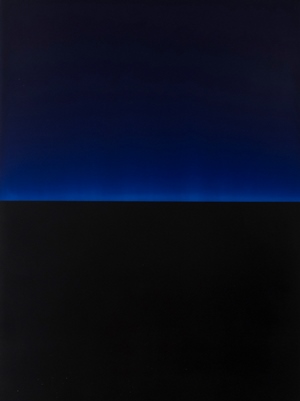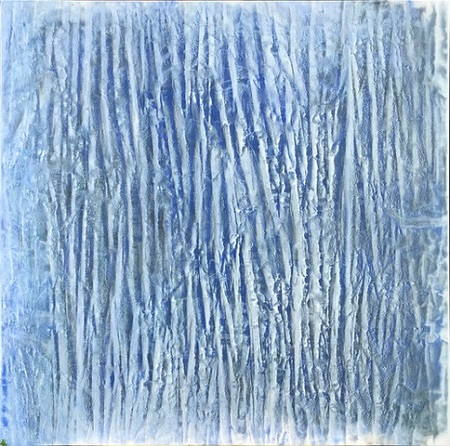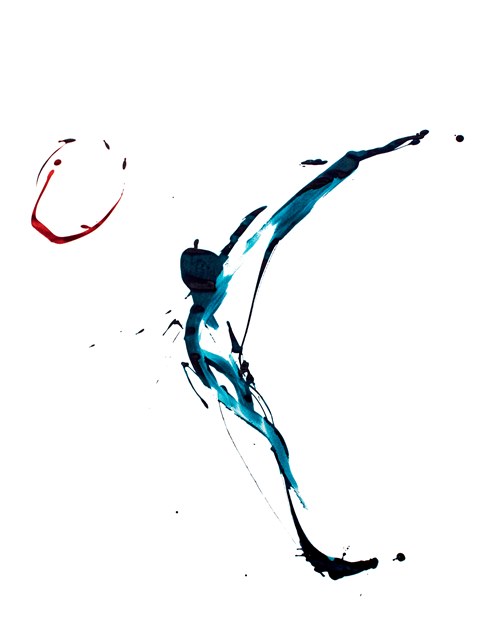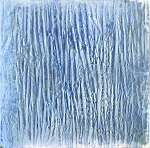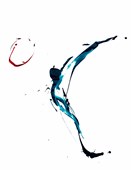Born in Paris in 1973 where she lives and works, Elissa Marchal belongs to this generation of artist that followed the footsteps of both the twentieth century abstraction movements, and the Modernist of the twenty-first century such as Mondrian and Matisse. Not only does her work recall those past, it also aims to renew and refresh those artistic concepts.
For example, while maintaining a homogeneous texture of colour in her Constructions, Elissa Marchal creates a paradoxical lightness to her intricate sculptural works by dripping paint on its extremities with colour gradients. The contradiction that emerges between the material, the technique and the colour enables to create a painterly composition without any strokes, something that is new, more physical than traditional painting and yet that links to former influences such as Jackson Pollock and Frank Stella.
This technical and theoretical exploration continues with the Jalousies, Cadres and the Horizon series, where colours, reflection and emptiness question the boundaries between different mediums. In the Cadres series Elissa Marchal uses only one constitutive elements of the painting medium, its frame, to create an object that challenges the traditional perception of image making.
Similarly, Jalousies with its subtle linearity and minimalistic appeal, unveils through thin reflections of colour on the white wall a larger problematic. What are the limits of the art object and what parts of the spectactor's subjectivity plays into this conceptual construction? Both art and spectator are at constant interplay.
This process continues with the Horizon series. The spectator is confronted to the double perception of attraction and repulsion, through the contrast of two equally sized coloured rectangle, and the creation of a border between both on the painting. This new frontier of colour, thus, allows for an infinite reading and aesthetic experience, varying between its two minimalistic but intense poles.
Her work is a continual reflexion on the role of shape and colour within the medium of painting. She has often participated in the Salon de Montrouge and the Salon des Réalités Nouvelles which are two mainstay of the French art scene to discover new talented artists.
____
In partnership with the exhibition « Vicky Colombet and Claude Monet, From the floating world», the third in its series of Unex- pected Dialogues at Marmottan Museum (14 octobre 2020 - 2 May 2021).
With a career spanning over three decades, Vicky Colombet?s abstract paintings, works on paper, prints, fine art photography, and architectural glass projects exist in conversation with various art historical movements from traditional Chinese Painting to Abstract Expressionism.
Raised in Paris, Colombet whose mother was of Filipino descent spent her childhood traveling extensively with her parents across Southeast Asia and India. Eastern thinking became an important part of Colombet?s perception of the world. Colombet studied law at the Sorbonne and began her career as a graphic designer and writer before being invited to study in the Paris atelier of Henri Dimier (1899-1986). They shared an interest in the metaphysical beliefs in what lies beyond, underlies or transcends the physical nature of the world and reality.
Colombet?s meditative paintings reference the natural world by taking the abstract energy, topography, and sensibility of lands- capes as a source of inspiration.
There is an ambiguity at what we see, and an uncertain scale, a magnified particle, a planetary or interstellar landscape. «In my work, I?m often not referring to a particular landscape, but rather trying to create a visual catalyst that prompts our thinking of places and how we imagine them. I am much more interested in the construction of ideas about landscape. It is a rich, subjective, internalized exercise that can function almost like poetry.
____
Karen Farkas was born in Paris in 1972. At first student of the Paris Villemin School of Architecture, Karen Farkas followed architecture courses in order to open her mind and build her own vision of the world. She graduated in 1997, using the fol- lowing theme project : " The whole tree is also, to the bird, the nest entrance». But she has always been a painter.
She practiced her craft through research on social housing as well as creation and implementation of interior decors for major collectors.
In 2002, she decided to concede to her frist vocation and devoted herself exclusively to painting and drawing.





